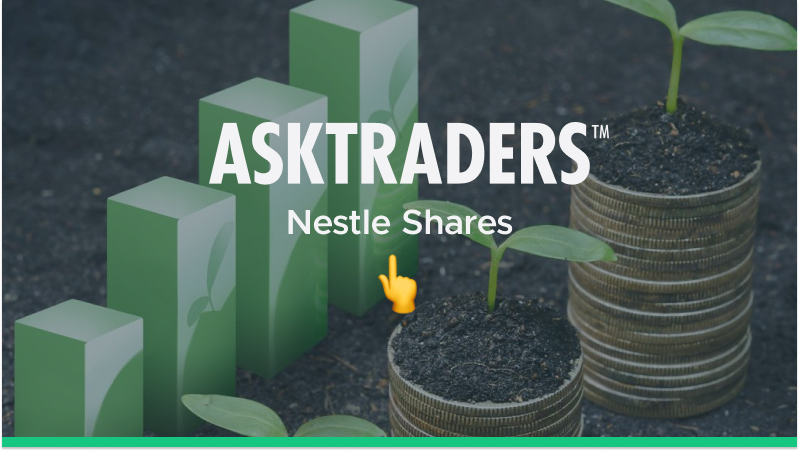Nestle (SWX: NESN) is a Swiss multinational food and beverage giant with a rich history and a global presence. Founded in 1866 as a producer of infant food, Nestle has evolved into one of the world’s leading consumer goods companies and forms part of the Swiss Markets Index (SMI) for leading local companies.

Nestle has successfully diversified its product offerings to include a wide range of food and beverage products, with various brands under its umbrella. From confectionery, dairy products, and pet care to coffee, bottled water, and infant nutrition, Nestle has established itself as a household name.
Nestle’s solid financial performance and consistent dividend payouts have made it an attractive choice for investors seeking stability and long-term growth. Nestle shares are listed on the SIX Swiss Exchange under the symbol NESN (CH0038863350).
Nestle Share Price Chart
YOUR CAPITAL IS AT RISK
Nestle Share Price & Dividend Yield
The firm has a track record of once-per-year dividend payments, which have consistently grown over the years. The current Nestle dividend yield sits at a healthy 3.08%.
Despite Nestle’s position as a global consumer goods powerhouse and one of the top Swiss listed stocks, its share price has been on a downtrend for the last couple of years. The stock is trading at levels last seen in February 2021 as the company recently warned of an organic sales growth slowdown due to “unprecedented inflation over the last two years,” which has “increased pressure on many consumers and impacted demand for food and beverage products.”
Nestle EPS and Revenue Breakdown 2020-2023
| Nestle | Annual EPS | Annual Revenue |
|---|---|---|
| 2020 | CHF 4.30 | CHF 84.3 billion |
| 2021 | CHF 6.06 | CHF 87.1 billion |
| 2022 | CHF 3.42 | CHF 94.4 billion |
| 2023 | CHF 4.24 | CHF 93.0 billion |
Food & Beverages Industry Comparison
YOUR CAPITAL IS AT RISK
Nestle Share Price Forecast
When looking ahead to where Nestle’s shares could move to over the next 12 months, analysts haven’t been too positive recently. Jefferies analyst David Hayes lowered the price target on Nestle to CHF 84.50 from CHF 86 in a recent note, keeping an Underperform rating on the stock.
Meanwhile, RBC Capital recently upgraded Nestle to Sector Perform from Underperform, lowering the price target to CHF 96, down from CHF 97 per share. The firm’s analysts stated that the Nestle share price now more fairly reflects some of the company’s “vulnerabilities as well as its myriad qualities.”
Stifel cut Nestle to Hold from Buy, lowering the price target to CHF 106 from CHF 125 per share. Stifel analysts said the company’s “magic is gone” following its underwhelming fourth-quarter report.
Our View: As a consumer goods giant, Nestle as an investment will continue to remain appealing, especially as its share price continues to fall. Investors with a focus on companies that payout dividends may want to take a closer look at the stock, especially due to its resilience during economic downturns.
Who Should Buy Nestle Shares
When considering whether Nestle shares are a suitable addition to your investment portfolio, several factors should be taken into account. While these aspects will be different depending on your personal circumstances, make sure to assess factors such as dividend income, risk tolerance, investment timeframe, growth prospects, and valuation considerations.
Investors who focus on dividend income may find Nestle shares slightly attractive. While dividends are only paid once per year, the company has a history of providing reliable dividend payouts that have grown over the years. Nestle’s consistent performance and established position in the consumer goods industry make it a potential option for income-oriented investors seeking stable and predictable returns.
Investors with a moderate risk tolerance may consider Nestle a suitable option. The company’s stable financial performance and diversified product portfolio contribute to its resilience during various market conditions.
Nestle’s long-term growth potential should be a key consideration for investors. The stock’s performance may not provide investors with confidence, so it may be better suited to those with a longer investment horizon.
Investors should assess Nestle’s valuation in relation to its growth prospects and industry peers. The company’s ability to navigate market dynamics and its track record of adapting to changing consumer preferences should be factored into the investment decision.











